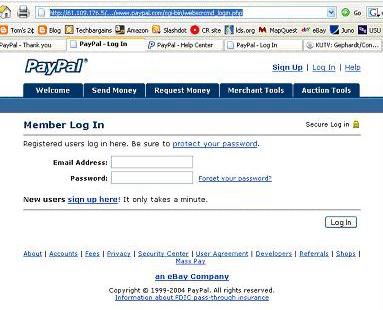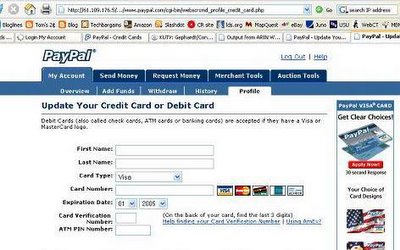This was borrowed from David Wiley's site, iterating toward openness » Great Screencast on Screen/Podcasts in Education: "I never thought I’d see a screencast in a screencast, but that is just what I got watching this fabulous presentation about using screencasts, podcasts, blogs, etc. in support of education. Any time you come away with brand new ideas about how to be a better teacher, more efficiently, you have to share…"
I had to throw this on my blog for the hundreds of fellow teachers who are subscribed... the silent, lurking masses that do not register on any of my counters.... Anyway, this screencast is a must-see for anone who is new to this stuff, especially for teachers seeking new ways to reach students. I loved that the podcast of the quantum physics lecture ended up on the top 100 podcasts list. People are curious. One more thing: this screencast didn’t work for me in Firefox, so you may have to use something else.
Monday, October 31, 2005
Saturday, October 29, 2005
Beware! Spoof emails are getting trickier!
It is more important than ever for Internet consumers to make sure they are on secure (https://), verified connections before doing any kind of business online.
In the past I have received legitimate emails from PayPal asking me to go through a similar verification process, so I was fooled by this copy-cat spoof email and website. Beware that spoofers are getting trickier!

Above is a screenshot of the fake PayPal log in. It looks and works just like the real one, except you are not on a secure connection. (It's hard to see in the screenshot, but the address starts with "http://" and not "https://")

Once you "log in" (and they get your PayPal password), you are prompted to update your credit card. The only thing that has been added here is a space at the bottom for you to enter your ATM PIN number. Once they have this information, they can go to town on your credit card!
I received a spoof email yesterday from “PayPal” that was so convincing that I almost fell for it. I am concerned that many other people will fall for this particular scam because it is so similar to a genuine PayPal email. Here is what is makes this spoof trickier:
- It didn’t ask for personal information in the email itself. These kinds of emails are a more obvious form of what is called “phishing.”
- The email, which didn’t have my name on it (another clue I missed), told me that my PayPal account been accessed from a foreign IP address and that I needed to verify my account.
- The site it took me to when I clicked the link looked EXACTLY like www.paypal.com’s log in screen. Most of the links on the page still linked to PayPal to make it even more convincing.
- Everything it the website asked me for seemed legitimate EXCEPT it also asked for my credit card’s ATM PIN. This was very suspicious, and I stopped filling out the form. I don’t know for sure if my PayPal account info or credit card number were compromised, but I decided to play it safe and close both accounts.
- After looking more closely, I also noticed that I was not on a secure connection (https://), even though the spoofers had cleverly inserted the same yellow lock graphic that is on PayPal's secure site. Although the web address contained the name paypal.com, it was preceded by this combination of numbers: 61.109.176.5 (an alternate IP address).
- I looked up the spoofer’s IP address (61.109.176.5) using WhoIs, and it belongs to Asia Pacific Network Information Centre, located in Australia! Sound “phishy” enough?
In the past I have received legitimate emails from PayPal asking me to go through a similar verification process, so I was fooled by this copy-cat spoof email and website. Beware that spoofers are getting trickier!

Above is a screenshot of the fake PayPal log in. It looks and works just like the real one, except you are not on a secure connection. (It's hard to see in the screenshot, but the address starts with "http://" and not "https://")

Once you "log in" (and they get your PayPal password), you are prompted to update your credit card. The only thing that has been added here is a space at the bottom for you to enter your ATM PIN number. Once they have this information, they can go to town on your credit card!
Wednesday, October 26, 2005
Cheese stick overdose?
Am I an instructional designer?
I am about to print some business cards (you know, the do-it-yourself kind), and I am trying to figure out what titles to give myself. “Student” just doesn’t sound worthy of a business card. Maybe “PhD student,” but I am not officially in the PhD program, so it that lying? And if I’m going to stretch the truth a bit then I’m on that slippery slope that leads to falsified Microsoft certifications and the like. If I’m going to do that then I may as well photoshop my name on someone else’s diploma and be done with it!
So I’m back to nothing for a title. But I taught French and Computer Science in the public schools for seven years! Doesn’t that count for anything? Still, if I just wanted “Teacher” under my name I would have stayed at Redlands High School. So what else can I put on my Office Depot brand, premium matte, ivory business cards? I got a master’s in instructional technology while I was a school teacher. Does that make me an instructional designer? I don’t think so. I need job experience. Maybe I can get a $6/hour job at USU doing instructional design work to feel worthy of the title. Nah, I’d rather have extra time to go fly fishing. Besides, the one job I’ve had at USU only lasted a day…
<sidenote>
I got one of those $6/hr computer jobs at the start of Fall semester because I felt guilty about not working. (In the past I have almost always worked at least part-time as a student.) That night I was at the used CD store and couldn’t bring myself to buy anything because I knew buying a $6 used CD represented an hour’s worth of work. So I quit my job the next day. I haven’t felt guilty about spending money ever since.
</sidenote>
OK, time to make a decision. Here are my top three idea for my business card:
Tom Caswell
Instruction Designer Wannabe
Tom Caswell
Nearly-matriculated PhD Student
Tom Caswell
Unemployed by choice
Forget it. I’ll make business cards later.
So I’m back to nothing for a title. But I taught French and Computer Science in the public schools for seven years! Doesn’t that count for anything? Still, if I just wanted “Teacher” under my name I would have stayed at Redlands High School. So what else can I put on my Office Depot brand, premium matte, ivory business cards? I got a master’s in instructional technology while I was a school teacher. Does that make me an instructional designer? I don’t think so. I need job experience. Maybe I can get a $6/hour job at USU doing instructional design work to feel worthy of the title. Nah, I’d rather have extra time to go fly fishing. Besides, the one job I’ve had at USU only lasted a day…
<sidenote>
I got one of those $6/hr computer jobs at the start of Fall semester because I felt guilty about not working. (In the past I have almost always worked at least part-time as a student.) That night I was at the used CD store and couldn’t bring myself to buy anything because I knew buying a $6 used CD represented an hour’s worth of work. So I quit my job the next day. I haven’t felt guilty about spending money ever since.
</sidenote>
OK, time to make a decision. Here are my top three idea for my business card:
Tom Caswell
Instruction Designer Wannabe
Tom Caswell
Nearly-matriculated PhD Student
Tom Caswell
Unemployed by choice
Forget it. I’ll make business cards later.
An idea for my learning objects project
I've been following some of my classmates blogs, and it looks like most INST 7150 folks are starting to get serious about final project ideas. Here is some background on my project and the quickie version of what I want to do: I used to enjoy helping friends and family with various computer questions and issues. This included everything from saving a file to starting a new website. It didn't take long before I started getting the same questions over and over again, kind of like Groudhog Day. So I want to put together a collection of resources to answer some common computer questions that I keep getting. I am not sure anyone will ever look at them, but it will make me feel better to have something to refer people to when I am too busy to help. Here are some examples of the questions I want to include in my collection (I realize that many are specific to the PC):
- What is System Restore and how do I use it?
- What is spyware and how do I get rid of it and then prevent it from coming back?
- What is the difference between XP Home and XP Professional?
- What are cookies?
- What are Windows updates?
Wednesday, October 19, 2005
"What time is your name?"
This is the all-time best question to ask people (especially children) who don't speak English very well. It's great for when you are in a foreign country and someone is trying to practice their 3 sentences of English on you... especially if you are in a hurry to get somewhere. This question produces some of the best puzzled looks I have ever seen.
Tuesday, October 18, 2005
If I had a nickel for every blog...
If I had a nickel for every blog I've started, I'd have about 25¢. I closed down my other blog because it had RSS issues. I tried "untweaking" the tweaks, but it was quicker to start a new one. Besides, blogs are cheap.
Subscribe to:
Posts (Atom)



 Digg/idig
Digg/idig Flickr/caswell_tom
Flickr/caswell_tom Facebook/Tom Caswell
Facebook/Tom Caswell Linkedin/tomcaswell
Linkedin/tomcaswell Twitter/tom4cam
Twitter/tom4cam YouTube/tom4cam
YouTube/tom4cam Last.fm/tom4cam
Last.fm/tom4cam Del.icio.us/tom4cam
Del.icio.us/tom4cam Wikipedia/tom4cam
Wikipedia/tom4cam Wishlist/Tom Caswell
Wishlist/Tom Caswell Technorati/tom4cam
Technorati/tom4cam